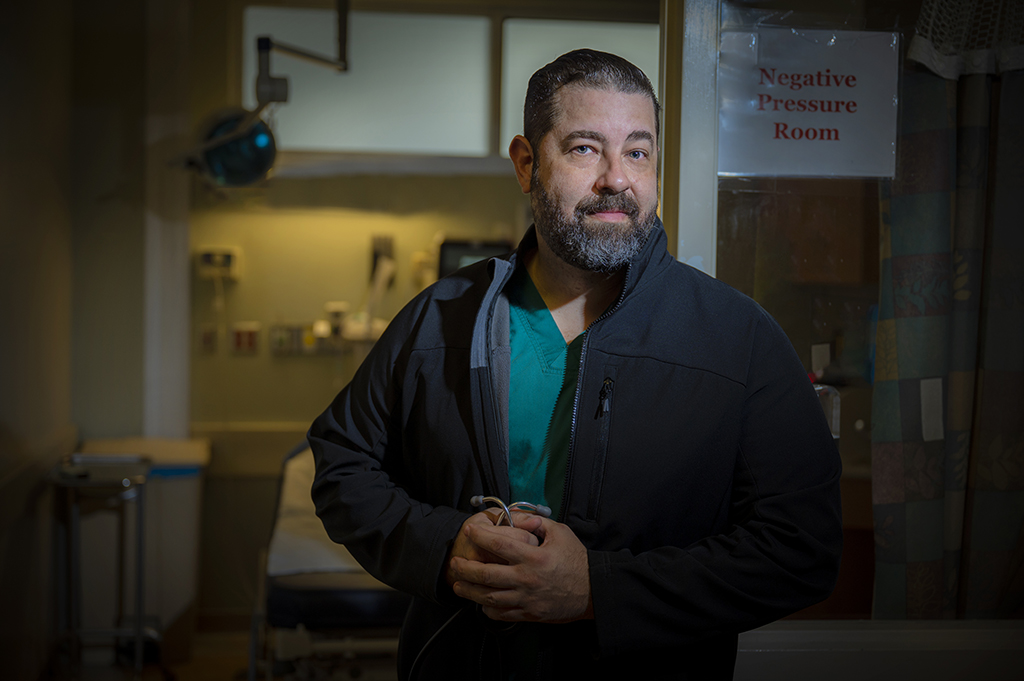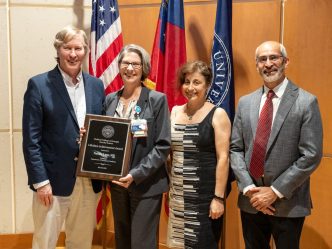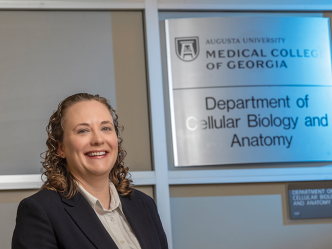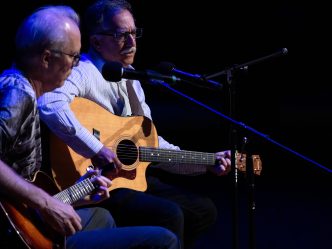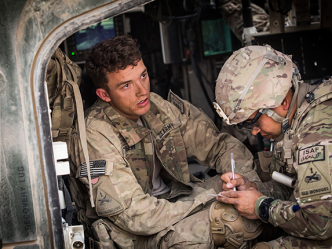Dr. Alejandro Báez wears many hats at Augusta University while also helping other nations stay healthy through hurricanes, earthquakes and the pandemic.
He is a professor of emergency medicine and epidemiology in the Medical College of Georgia, vice chair of operational medicine and director of the Center of Operational Medicine.
He is also the program director of the EMS/pre-hospital medicine fellowship, co-director of the Master in Clinical and Translational Science program and faculty member in the Master of Arts in Intelligence and Security Studies program.
Báez said his decision to pursue medicine was in his genes: the third-generation physician followed in the footsteps of his father, an OB/GYN, and grandfather, who was in laboratory medicine.
“My grandfather was founder and later director of the Dominican National Laboratory and my father was a basic sciences university professor who mostly focused in primary care,” said Báez, who has been at Augusta University since 2019. “When I was 6, my father took me with him to a microbiology lecture he was giving at Universidad Nacional Pedro Henríquez Ureña. I was so impressed and paid profound attention. I went home and immediately told my mother all the things my father had taught at the lecture.
“She seemed to believe that my ability to understand the lecture was a sign that I should pursue medicine, and she encouraged me. From that moment on, I developed an interest in medicine, health care and academia.”
Báez was born and raised in the Dominican Republic. His interest and passion for emergency care started after he graduated high school and took a course where he volunteered with the Red Cross ambulance service. He enjoys the multidisciplinary nature of emergency medicine and feels gratified to make a difference and help others in critical moments, where returns can be immediate.
“I joke that I jumped on an ambulance at age 18 and have never gotten off,” said Báez, who at 25 became the national chief of emergency and disaster operations for the Dominican Red Cross during Hurricane Georges. “During medical school, at night I attended technical school and graduated from the first paramedic class in the Dominican Republic. The more I was exposed to, the more I fell in love with emergency medicine and knew it was my calling.”
Driven to help
He graduated with honors from medical school in 1998 and then worked one year for the government, per Dominican Republic guidelines, to secure his final license to practice medicine.
In January 2000, he moved to New York to pursue a double master’s in health care management and public health at New York Medical College. That summer, he was accepted into the Albert Einstein Emergency Medicine Clinical Research Fellowship, and in 2002, he was accepted into the Mayo Clinic emergency medicine residency program. By 2005, Báez became the first international medical student to complete the program.
After that, he was accepted into the Harvard/Brigham and Women’s Hospital fellowship in trauma and surgical critical care. After working with the Harvard system for four years, he moved back to the Dominican Republic, where he created and chaired the first combined academic Emergency Medicine and Critical Care Department. He also developed and directed the first dedicated international/medical tourism hospital department in the country.
“We had residencies and fellowships, developed research efforts and innovated throughout… I was very happy generating change and improving acute care there,” said Báez, who was also associate dean of the medical school.
In 2010, he was at the Miami airport after attending a disaster management instructor course when he heard about the earthquake in Haiti. When he landed, “it was chaos.”
“I worked three days straight with the medical evacuations and was later asked by the vice president of the country to serve as his envoy and go to the border, where we started working on a bi-national (Haiti/Dominican Republic) hospital system that ultimately cared for 5,000 victims of the earthquake,” he said. “All this work was possible with a lot of great assistance from my friends in the Harvard system.”
After five years in the Dominican Republic, he was recruited as a medical director and program director to develop the first Accreditation Council for Graduate Medical Education emergency medicine residency program in south Florida at Jackson Memorial Hospital.
Báez credits his interest in international and global health for his motivation to complete his master’s in public health and later to work with the Harvard system and the Brigham and Women’s Division of International Health and Humanitarian Programs.
He said he’s fortunate that his experience in capacity building, education, and humanitarian and consulting work mostly with a focus on Latin America and the Caribbean has been able to contribute to the development of acute care systems in the Dominican Republic.
“It is very gratifying, and a way to give back to my birth country.”
Preparing to tackle a pandemic
Dr. Richard Schwartz, chair of emergency medicine at the Medical College of Georgia, recruited Báez to Augusta University. Báez had only been in town a short time before the COVID-19 pandemic began. His previous work experience helped him prepare the hospital for what was coming.
Báez was tasked initially with developing AU Health’s ICU COVID surge program. On March 30, 2020, Báez received an unexpected call from the president of the Dominican Republic, asking him to serve as his lead for COVID preparedness and response.
After he consulted with his chair and Augusta University leadership, as well as the U.S. Department of State, the Dominican Republic president issued a decree and appointed Báez senior public health advisor and CEO for the presidential COVID taskforce.
“I am very happy that all who supported me understood the basic principle that a pandemic is a global problem that demanded global solutions. The COVID taskforce oversaw all strategy, policy and tactics related to COVID response in the Dominican Republic,” Báez said.
“We created an innovative, and now recognized by various international organizations, public value model to be reproduced locally at the provincial and municipal level, creating public and private partnerships at the local level. We also developed the first Public Health and Epidemiology Intelligence Fusion Center, collaborating with the Pan American Health Organization (PAHO), Centers for Disease Control and Prevention, the National Health Service Ministry of Health and the Ministry of Defense.
“We did a lot of good and worked with many great individuals. To this date the Dominican Republic COVID data is much superior to many more developed countries. All probably directly related to a comprehensive test, trace, treat and isolate strategy. We utilized technology to develop telemedicine solutions, home health visiting teams, dedicated isolation hotels and optimized testing platforms, while at the same time created a dedicated COVID-19 hospital circuit with thousands of additional hospital and ICU beds.”
The pandemic was almost immediately turned into battle lines for political parties, and Báez said politicizing COVID was, and still is, a big problem all over the world.
“We understood very early on the importance of avoiding COVID within a political narrative, and I personally called out politicians who used COVID as a political tool,” he said. “It was a presidential election year in the Dominican Republic in 2020, and we immediately understood that working as a presidential palace office entity, we needed to create trust and transparency.
“As such, we implemented partnerships with the private sector; [created] strong collaborations with the World Health Organization, PAHO, CDC and other international organizations; [ensured] all data reporting was based on official international organizations to avoid false perceptions; [implemented] daily press meetings by the ministry of health; [had] frequent press appearances to explain and clarify process and policy; [created] partnerships with all political parties; strictly enforced policies like mask wearing and lockdown, and explained the science backing those actions; and developed a non-partisan scientific committee with research, clinical and ethics experts from the Dominican Republic and a second international committee composed of U.S. and European experts. [We did] all of this to be fair, objective and create much-needed trust.”
Overcoming the obstacles
Initially, Báez said getting everyone on board with a national strategy and creating trust was probably the biggest struggle he encountered. They were able to implement a pilot project in the province of Duarte that changed the trajectory in the Dominican Republic, created public-private partnerships, involved municipal government and deployed innovative solutions. “Every move we made, we did community consults and town halls and engaged local leadership and press,” Báez said.
But he said the key obstacle to fight has been disinformation.
“There are two variants to this: politically generated and a second, less-clear misinformation by auto-experts and people who want to be COVID pandemic heroes,” he said. “So we must create trust with transparency, data and tech solutions, and by engaging international organizations.”
Another important challenge is understanding the important balance between what is needed for public health, the economy and civil liberties.
Thinking back to Haiti, he said it’s frustrating and “quite sad” to see the lack of resources in this neighboring country. Haitian President Jovenel Moïse was assassinated July 7, which led to more unrest and uncertainty. Báez added he is working with the Dominican Republic Ministry of Foreign Affairs, PAHO and the Partners in Health non-governmental organization in an attempt to develop health-strengthening projects.
“The good people of Haiti deserve better… Health should not be a privilege; it’s a basic human right,” Báez said. “I know many great people who live in Haiti and great non-governmental organizations that operate in Haiti… It has the lowest economic, social and development indicators, plagued by corruption and civil unrest.”
Báez said some of his struggles early on related to being an immigrant and having to prove himself at highly reputable academic environments such as Mayo Clinic and Harvard University. He describes himself as an eclectic academician with various interests, mostly overlapping the areas of government, security, health care and public health.
He said here at Augusta University, “I have the perfect job… an amazing fit for my interests with great collaborative and growth opportunities.”
He also feels AU Health has immense talent with the opportunity to strengthen its international and global health presence.
“Global Health is a field that by definition tells us we are all connected… health challenges unite all of the human race,” Báez said. “Public Health solutions are simply in our collective hands and brains.
“The Medical College of Georgia is one the oldest medical schools in the U.S. AU has amazing faculty and expertise that can help break traditional models and build an innovative framework for public health academics, one that goes beyond conventional thinking and integrates technology research, systems management, policy consulting, capacity building and international medicine and medical tourism. Right now, it’s important to look at all the experiences we have built and all the lessons the pandemic has given us. With an ‘act local, think global’ perspective, we can grow exponentially.”
 Augusta University
Augusta University
